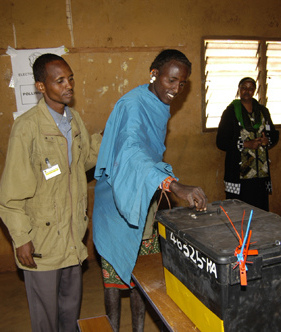Philip Amis is a specialist in urban poverty and institutional reform.
I have known Kenya for nearly thirty years since I did my PhD at the University of Nairobi. I think in some respects the coming year is absolutely critical to Kenya’s future –and given Kenya’s critical geostrategic position, it will also be critical for East Africa as a whole.
Kenya had a very close run election in December 2007 which was disputed and called unsound by the EU. The result was a series of violent conflicts in Nairobi, the Rift Valley and Western Kenya. In total it was estimated that 1500 people were killed and around half a million people displaced. For a moment it looked like Kenya was about to descend into a full scale civil war. Fortunately the Kenyan military, while fraying at the edges, in the end stayed together and did not fracture on ethnic lines.
After a tortuous process with support from the international community led by Kofi Annan, the two main political parties arrived at a form of reconciliation and an accord. The result was a coalition government and a series of ambitious reform agendas established with a view to preventing the conflict starting again. This included reforms to the electoral process and critically the Constitution. These reforms are critical to implement in 2010 as the window of opportunity is rapidly closing before Kenya becomes focused on the 2012 election. It is widely suggested that the fragile coalition government will fracture in advance of the election.
The problem is the deep seated “rules of the game” in Kenyan politics. Firstly Kenyan politics is firmly based on patronage politics usually based on ethnicity; political parties are highly fluid and unstable and are organised around patronage politics. A culture of impunity exists (i.e. no senior politician or official is accountable). Within this system it is very difficult to see where a “new politics” could come from. The potential positive forces like the civil society sector; local community development processes, the free press and media and the strength of the business community are dwarfed by the challenges they face.
Kenyan politicians have been pretending to set up the reform process with task forces and commissions of inquiry which are stalling tactics while the politics can continue as before. The Kenyan public can see through this with an exceptionally high level of public cynicism and disillusionment.
More worrying, the militias and criminal gangs who were deeply implicated in the post election conflict have not been disarmed; indeed it is suggested that they are getting better armed. Any potential future conflict is likely to involve more sophisticated weapons than the low tech weapons that characterised the post election violence. In addition it is also suggested that these groups and organizations are becoming increasingly autonomous and may not be under the control of their political patrons. The result is that the likelihood of violence around the next election is judged as medium to high.
A team monitoring the Accord note that 2010 is the last chance to get the reforms moving before the election crowds out the process. I hope that Kenya’s politicians wake up and realise that more of the same will not do before it is too late. The stakes could not be higher.
 Photo credit: Joshua Wanyama / CC BY-NC-SA 2.0
Photo credit: Joshua Wanyama / CC BY-NC-SA 2.0
Kenyans in the USA marched to protest the violence in January 2008.

